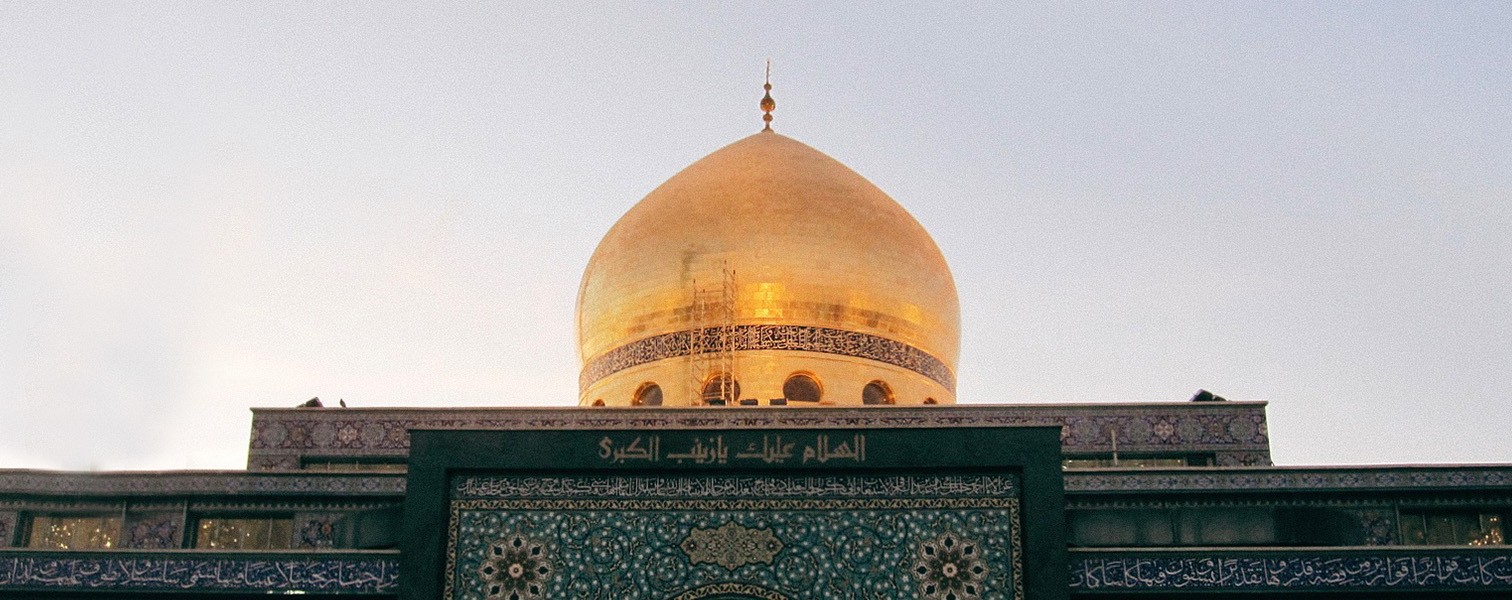Sayyida Zaynab bint Ali (p)
Home » Islamic Awareness » Islam 101 » Beliefs » Ahl al-Bayt (p) » Sayyida Zaynab bint Ali (p)
Sayyida Zaynab bint Ali (peace be upon them)
Name: Zaynab
Title: al-Aqilah
Kunya: al-Hawraa’
Father: Ali ibn Abi Talib (pbut)
Mother: Sayyida Fatimah bint Muhammad (p)
Born: 5 Jamadi al-Awwal, 5 A.H.
Death: 15 Rajab, 62 AH
Age at Death: 57
Buried: Damascus, Syria (per most historians), however, it is also said that she was buried in Madinah, in the Arabian Peninsula, or Cairo, Egypt.
Sayyida Zaynab bint Ali (p)
With parents such as Imam Ali ibn Abi Talib (p) and Sayyida Fatima (p) and grandparents such as Prophet Muhammad (pbuh) and Lady Khadija (p), there is no doubt that the upbringing of Sayyida Zaynab (p) would be beyond exemplary.
She grew up in Medina, where she was married to Abdullah ibn Jafar al-Tayyar, who was brought up under the direct care of the Holy Prophet (pbuh & hp).1 Together they had five children, four of whom were sons, Ali, Aun, Muhammad, and Abbas, and one daughter, Umm Kulthum.2
Sayyida Zaynab (p) was no stranger to death or oppression. We know her best for the crucial role she played during the events of Karbala in 61 A.H. when she was 55 years old. She witnessed the martyrdom of her own children, her nephews, companions, and most significantly her beloved brothers Abbas ibn Ali Talib (p) and Imam al-Hussain (p). Sayyida Zaynab’s (p) strong upbringing, piety, and nobility ensured she was not weak in the face of adversity. Therefore, after Imam Hussain (p) was mercilessly martyred, she became the pillar for the other women and children. She, therefore, serves as an example of steadfastness, courage, humility, and strength for all of us. Most Merciful and Most Compassionate, and God is sufficient for us and the best advocate.
The following is an excerpt of the sermon Sayyida Zaynab (p) gave in the courtyard of Yazid’s palace in Damascus after they were brought as prisoners:
“All praise to God, Lord of the worlds, and may His peace and blessings be upon Muhammad and his family. Truly God is truthful when He said, ‘The end of the evil-doers was terrible, for they had rejected the revelations of God and mocked them.’130 O’ Yazid, do you assume that when you constricted upon us the roads and horizons of the sky that we became slaves or captives, and as such, that we were [somehow] forsaken by God and you were honored? And that what has occurred [to us] is because you have a great status with Him? Thus, you are boasting about your [so-called] greatness and arrogantly looking down on us? You are elated and pleased because you perceive the world is submitting to you, the conditions are as you wanted, and you consider that our status and authority has become yours? But, wait and be aware, have you forgotten what God has said, ‘The unbelievers must not think that Our respite is for their good. We only give them time to let them increase their sins. For them there will be a humiliating torment…”
“So plot whatever schemes you have and expend as much effort as you want [in achieving them], [but remember] by God, you will never erase the memory of us, eradicate our inspiration, reach our status nor rid yourself of this shame. Your view will be futile, your days will be short, and your wealth will not avail you on the day when the caller announces, ‘may the curse of God be on the oppressors’. Praise to God who sealed the life of our early ancestors with happiness and forgiveness, and for our last ones with martyrdom and mercy. We ask God to complete His reward for them and increase His bestowal upon them, and make our succession successful and good. He is Most Merciful and Most Compassionate, and God is sufficient for us and the best advocate.”3
- Kbaisi‑Hazari, Hajjah Chahnaz A. Who Is Zaynab? p. 13.
- Kbaisi‑Hazari, Hajjah Chahnaz A. Who Is Zaynab? p. 9.
- Kbaisi‑Hazari, Hajjah Chahnaz A. Who Is Zaynab? p. 92-95.

